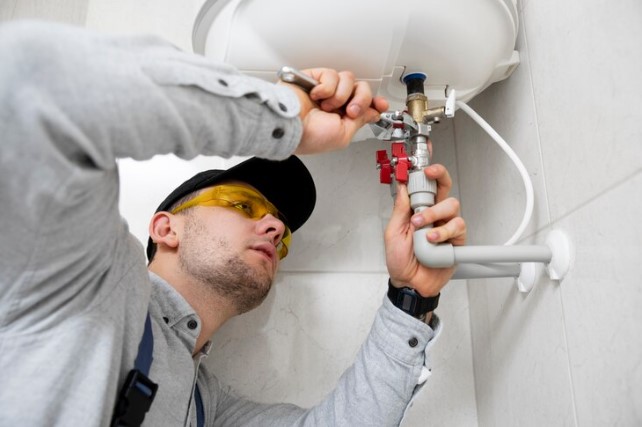Regular plumbing maintenance is essential for the longevity and efficiency of your home’s plumbing system. In Australia’s diverse climate, adapting your maintenance routine to the changing seasons is crucial to prevent major repairs, reduce water wastage, and ensure system efficiency and reliability. Each season, from the intense summer heat to the cold winter days, brings unique challenges, making year-round care vital.
Preparing Your Plumbing for the Summer HeatManaging Increased Water Usage
During Australia’s summer, water usage typically surges. To manage this effectively:
- Regular Leak Checks: Inspect all faucets, showerheads, and hose bibs for signs of dripping or leaking, as even a small drip can lead to significant water loss.
- Outdoor Taps and Fixtures Inspection: Ensure outdoor plumbing, including garden hose connections and sprinkler systems, is functioning correctly and leak-free.
Caring for Outdoor Plumbing
Summer demands particular attention to outdoor plumbing:
- Garden Hose Care: Regularly check hoses for leaks or wear and replace if necessary. Proper storage is vital to prevent sun damage.
- Sprinkler System Maintenance: Clean and adjust sprinkler heads to avoid water wastage. Consider upgrading to a water-efficient system like drip irrigation.
Winterizing Your Plumbing to Prevent DamageInsulation Techniques for Pipes
In colder regions, freezing temperatures can cause pipes to burst. To prevent this:
- Pipe Insulation: Use foam insulation sleeves on exposed or unheated area pipes to prevent bursting.
- Seal Gaps and Cracks: Properly seal gaps or cracks near pipes, especially those leading outside, to keep cold air out.
Protecting Indoor Plumbing from Cold
Indoor plumbing also needs attention during winter:
- Maintain a Consistent Temperature: Keep your home consistently heated to prevent pipes from freezing.
- Cabinet Doors: In cold weather, keep cabinet doors under sinks open to allow warmer air to circulate around the plumbing.
Spring Plumbing Check-Up and Maintenance
Spring is an ideal time for a comprehensive check-up of your home’s plumbing system.
This season is about rejuvenation and preparing for the heavier usage of the warmer months ahead.
Conducting a Home Plumbing Audit
Faucet and Showerhead Inspection: Check for any signs of leaks or drips. A leaking faucet can waste a significant amount of water over time. Also, clean any mineral deposits from the faucet aerators and showerheads to ensure proper water flow.
- Toilet Inspection: Look for hidden leaks by adding a few drops of food coloring to the toilet tank. If the color appears in the bowl without flushing, there’s a leak that needs fixing.
- Water Heater Check: Drain a few gallons from the water heater tank to remove sediment, which can reduce efficiency and lifespan. Also, check the temperature setting – it should be around 120°F to prevent scalding and save energy.
Cleaning and Maintenance Tasks
- Clearing Gutters and Downspouts: Remove debris from gutters and downspouts to prevent blockages and water damage, especially in preparation for the rainy season.
- Servicing the Water Heater: Have your water heater professionally inspected and serviced. This is crucial for tank heaters, as sediment and rust can accumulate and impact performance.
- Checking for Slow Drains: Use this time to clear out any slow-moving drains before they become clogged. Consider using a bacterial drain cleaner for a safe and environmentally friendly option.
Autumn Readiness: Preparing for the Rainy Season
Autumn in Australia can bring increased rainfall, making it essential to ensure your home’s plumbing is ready to handle the extra water.
Ensuring Proper Drainage
- Inspect Drainage Systems: Check that all outdoor drains are clear of leaves and debris. Poor drainage can lead to water accumulation and damage.
- Test Sump Pumps: If you have a sump pump, test it to ensure it’s in good working order before the rainy season begins.
Gutter and Storm Drain Maintenance
- Regular Gutter Cleaning: Clear out any leaves or debris that have accumulated in your gutters. Clogged gutters can cause water to back up and damage your roof or foundation.
- Storm Drain Check-Up: Inspect storm drains near your property for blockages. A blocked storm drain can lead to flooding and property damage during heavy rains.
Year-Round Plumbing Maintenance Checklist
Maintaining your plumbing system throughout the year is essential for preventing emergencies and ensuring everything runs smoothly.
Monthly Tasks
- Inspect for Leaks: Regularly check under sinks for signs of leaks or moisture.
- Test Water Pressure: Too high or too low water pressure can indicate problems in your plumbing system.
Quarterly Tasks
- Clean Showerheads and Faucets: Mineral build-up can affect water flow and pressure.
- Flush Toilets Not Regularly Used: This prevents grime from building up in the toilet bowl and ensures the flush is working correctly.
Biannual Tasks
- Water Heater Maintenance: Perform a more thorough inspection and draining of the water heater to prevent sediment build-up.
- Check the Sewer System: Have a professional inspect your sewer line every two years to prevent blockages and backups.
Annual Tasks
- Professional Inspection: Have a licensed plumber conduct a thorough inspection of your plumbing system. They can identify potential problems and provide solutions before they turn into major issues.
- Septic Tank Inspection: If your home has a septic tank, ensure it is inspected and pumped as needed.
When to Seek Professional Help
While many maintenance tasks can be handled independently, certain scenarios require professional expertise. If you encounter any of the following situations, it’s time to call a professional plumber:
Persistent Leaks
If leaks in faucets, toilets, or pipes persist despite your attempts to fix them, a professional can identify and repair the underlying issue.
Low Water Pressure Throughout the House
This can indicate more significant problems like pipe corrosion, hidden leaks, or issues with the local water supply.
No Hot Water
If your water heater fails to provide hot water, it could be due to a malfunctioning heating element or a more complex issue that requires expert attention.
Signs of Sewer System Backup
Unpleasant smells, gurgling toilets, and slow drains throughout the house can signal a sewer system backup. This situation needs immediate professional intervention.
Frozen Pipes
Attempting to thaw frozen pipes yourself can lead to them bursting. A professional plumber will have the right tools and techniques to safely thaw and repair them.
Renovations Involving Plumbing
Any home renovation that involves moving or installing plumbing should be handled by a professional to ensure it meets local building codes and standards.
Water on the Floor Around Plumbing Fixtures
Water pooling on the floor can indicate a leak in the fixture or the pipes, requiring a professional diagnosis to prevent water damage and mold growth.
Discolored Water
If you notice rust-colored or odd-tasting water, it could be due to corrosion in your pipes, necessitating a professional assessment.









